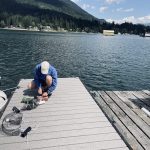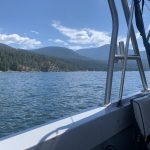Water Smart, snow Smart
Amelia Smart has a passion for water in all of its many forms. A talented ski racer and a regular member of Canada’s national ski team, she represented Canada at the 2022 Winter Olympics. When not ski racing Amelia is pursuing water-related studies. She joined the Living Lakes Canada team as an Intern this summer. We’ve been excited to have her energy and enthusiasm on board supporting a number of our programs and look forward to future collaborations.
My time as an intern with Living Lakes Canada started mid-May. During my time with the organization, I was able to dip my toes into a few of the water stewardship programs, understanding ongoing projects and daily activities via team meetings, reading and updating resource materials on the Living Lakes website, helping out with projects and fieldwork as well as participating in training opportunities.
These training courses have been some of the highlights of my internship. I was able to take the CABIN training course that Living Lakes Canada delivered this summer in Kimberley, B.C., and found it to be very valuable and interesting. I am now certified in a field sampling method that is federally recognized, which is a great asset for future fieldwork I may do or employment opportunities.
I was also able to attend a hydrometric training day in Fernie, B.C. We learnt how to install stream and river discharge measurement stations. I also participated in the LakeKeepers 1.5-day course on lake sampling and limnology that Living lakes Canada co-hosted with the BC Lake Stewardship Society in July. This course was a great refresher on limnology, and valuable to have a hands-on experience with lake sampling methods and equipment. I was also able to take The Fundamentals of OCAP online training course, which was my first introduction to how scientific research should be conducted when collaborating with Indigenous communities.
I was also able to help with days in the field. I worked on groundwater well installations and a hydrometric station installation. I learned new techniques and how much time, planning and proficiency it takes to ensure we are collecting accurate and reliable water data. I had more field days planned; however, I received a good lesson in fieldwork workplan fluidity and the unpredictability of nature. Many field days were delayed due to the high water levels of the late freshet.
Working with the Columbia Basin Water Hub database was also valuable. I got to work with some of the raw field data and learn the processing method for publishing.
Through some of the more day-to-day tasks, I gained an understanding of the amount of work that goes into running projects, in particular the required research into how these projects will be implemented and maintained to ensure they stay relevant and valuable.
I enjoyed my time at Living Lakes Canada immensely. I think it is a great internship for people like myself who want to learn and get experience in a variety of water-related projects and get a glimpse into how NGOs operate. I plan to pursue a Master’s degree in hydrology or water resource engineering and from observing how readily Living Lakes Canada works with students and universities, I can see myself potentially collaborating with Living Lakes Canada in my future thesis work.





